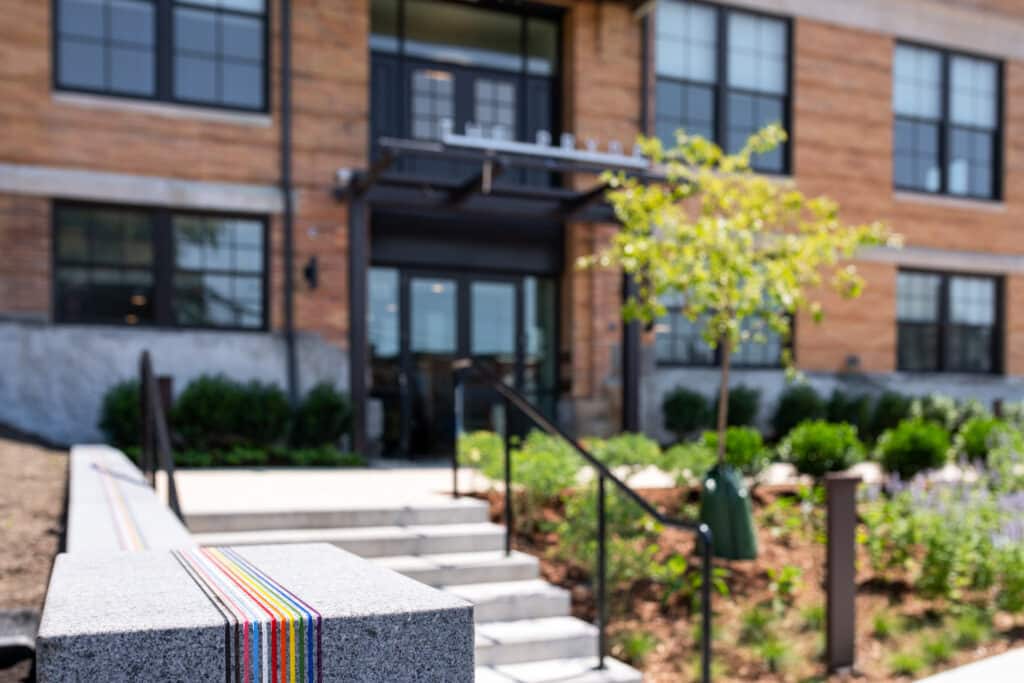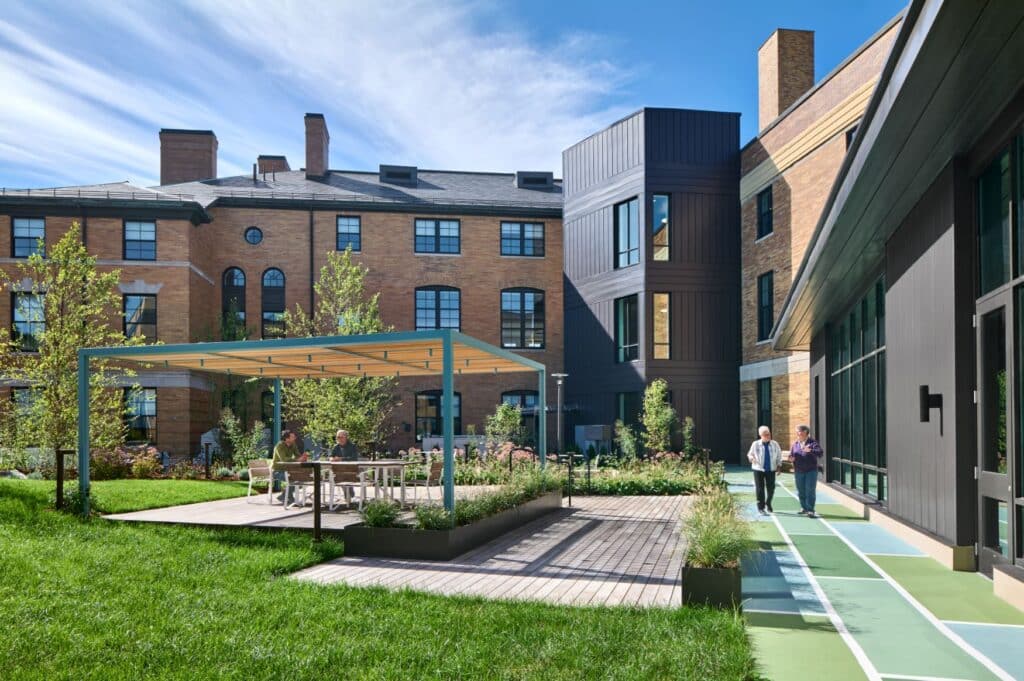Pride at Work at Boston Housing for Seniors

By Mark Fogarty
7 min read
Architects, developers and builders take justifiable pride in completing a successful affordable multifamily project. This is even more so the case at The Pryde, an LGBTQ-affirming development for seniors in the Hyde Park neighborhood of Boston.

“This is a very special one,” says Karmen Cheung, senior developer at Pennrose, which developed the Pryde in partnership with nonprofit, LGBTQ Senior Housing Inc.
“This is not Pennrose’s first LGBTQ-affirming project,” says Cheung. “The first one is in Philadelphia, John C. Anderson Apartments (named after the first openly gay Philadelphia city councilor). A small group of passionate individuals wanted to do one in Boston. This was before they knew about our project, and they were searching for a partner to help them achieve that vision.”
Learning of Pennrose’s Philadelphia project, they called the firm’s Philadelphia office to set the project in motion.
“They had this vision of what they wanted, which is safe, affirming housing for LGBTQ older adults,” says Cheung.
Among the advocates were architects Phillipe Saad and Aileen Montour. Montour is now the board president of LGBTQ Senior Housing, Inc., and Saad is the board vice president.
“They’ve been a partner throughout this whole journey of finding a site, assembling the financing, being with us through the whole construction and lease-up process too.”
The partners talked to the city of Boston, which was looking to take a former school, the 120-year-old William Barton Rogers School, and turn it into affordable housing through an adaptive reuse.
The site was congenial to the purpose as it is near transit stops, a library, an arts center and a YMCA.
“We all agreed it would be a really great site for the type of housing we wanted to create,” says Cheung.
The local community responded to the concept with 400 letters of support. “The city had never seen that many letters of support,” she says.
The city liked that the school building would be preserved and used for senior housing, Cheung adds. It selected the partnership in 2019.
The school, named after the founder of the Massachusetts Institute of Technology, included three wings, two of them added to the original building over time. The Rogers School was used variously as a high school and a middle school.
“Another fun fact is the television series “City on a Hill” was filmed there,” adds Charles Adams, Pennrose regional vice president. “Some of the police station scenes were filmed at that location.”
The building also has a connection to the well-known Civil War movie “Glory,” since the offices of the historic Massachusetts 54th Regiment featured in the movie are now at the project.
The heroes of the Massachusetts 54th trained in Hyde Park, not far from the school, and re-enactors in uniform can sometimes be seen.
The project got approval from both the National Park Service and the Massachusetts Historic Commission, allowing for awards of both Federal and State Historic Tax Credits.
Financing for The Pryde includes funding from the City of Boston Mayor’s Office of Housing and Community Preservation Act funding, soft loans and State and Federal Low Income Housing Tax Credits from the Executive Office of Housing and Livable Communities, State Historic Tax Credits from the Massachusetts Historical Commission and Federal Historic Credits from the National Park Service. TD Bank, facilitated through Redstone Equity, provided equity for all of the State and Federal LIHTCs, as well as construction financing. Massachusetts Housing Partnership is providing the permanent loan. Massachusetts Housing Investment Corporation provided the loan for State LIHTC equity and State Historic Tax Credit equity.
The Community and Economic Development Assistance Corporation and MassHousing oversaw the Commonwealth’s Community Based Housing funding and Affordable Housing Trust Funds, respectively. Grants from Federal Home Loan Bank of Boston, The Harry and Jeanette Weinberg Foundation, Farnsworth Family Trust, Liberty Mutual and LGBTQ Senior Housing, Inc. completed the financing.
Massachusetts Rep. Ayanna Presley worked with Senators Elizabeth Warren (D-MA) and Ed Markey (D-MA) to lead a successful effort to restore $850,000 in federal funding for The Pryde after Republicans removed it from a housing appropriations bill.
Cheung says the historic process was “a balancing act” between what the project could afford and what the governing bodies wanted from a preservation standpoint.
Since Pennrose has done other historic projects, “We kind of know what their requirements are,” says Cheung, who notes the historic credits can offset 25 to 30 percent of a development.
“We had a good working relationship with them as we moved through the project,” she says. “The state (Massachusetts Historic Commission) was also supremely supportive.”
Adams notes that accessibility was a challenge. “You have to make sure you can balance accessibility with historic issues. Some of the stairwells, we wanted to make sure they were preserved historically so that involved some real skill from our architect to make sure they were fire rated.”
Cheung adds, “There are so many stairwells! More than your typical two staircases.” As well, fire doors had to be added, which needed to resemble the doors that were already there.
Adams says, “We really wanted to preserve this building for the community of Hyde Park. Our first instinct was always to preserve as much of the features as we could.”
Cheung notes that the challenge was to keep as many historic features as possible “while improving the building envelope. Windows are a big piece of the envelope, and you need to get historically appropriate windows that meet high energy requirements. That is one thing that’s very difficult to move the needle on because those windows either don’t exist or are extremely expensive.”
She says that is a challenge that Pennrose will continue to face as it moves on to other historic projects.
Cheung says LGBTQ Senior Housing educated Pennrose as to what specialized needs residents might have at The Pryde.
“One of the key differences is who they have as their support because of what they’ve lived through. Often, they don’t have contact with their family. They don’t have a church community. A lot of their chosen family was ravaged by the HIV-AIDS epidemic,” says Cheung.
“So, the types of support they have to rely on may be far fewer than those available to other seniors.” The support of their fellow residents is seen as a critical need.
“Community was a key part of how we designed the building,” says Cheung. LGBTQ Senior Housing has its offices at the development.
At The Pryde, its 74 new apartments include rent-restricted studio, one- and two-bedroom apartments available to households and individuals at various income tiers (50, 60, 80 and 100 percent of Area Median Income).
Amenities include a landscaped courtyard, fitness center, laundry facilities, two private resident lounges and sunroom, large event and gallery spaces, classrooms for continued learning opportunities, and a resident cinema. On-site supportive services are available to all residents, including LGBTQ programming and services, according to the developer.

The company also says The Pryde building includes a 10,000 square-foot community center, which will include a learning classroom, library and art exhibition space, and host “Portraits of Pride,” a photography project that presents large-scale and intimate portraits of LGBTQ leaders through curated exhibitions and special installations. There will also be a multipurpose space for neighborhood meetings and events.